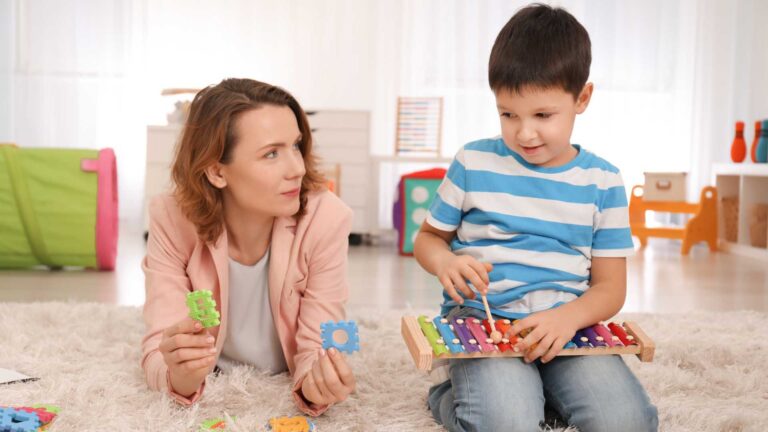What do I do after my child is diagnosed with autism?
Receiving an autism diagnosis for your child is a moment that can stir a whirlwind of emotions. It’s like stepping into unknown territory, and you might wonder, “What do I do after my child is diagnosed with autism?” Well, take a deep breath. We’re here to guide you through this journey with a sprinkle of understanding, a dash of knowledge, and much support.
Recognizing that there may be no cure for autism, it’s crucial to embrace hope. Your child will develop, learn, and acquire new skills. The initial steps outlined here involve educating yourself about your child’s autism diagnosis and adjusting, when possible, to cater to their needs. Moreover, parents should seek professional therapeutic services promptly.
In this blog by ABA Centers of Florida, we’ll be walking you through what to do after your loved one has been diagnosed with autism. You’ll learn about the basics of autism and why ABA therapy is the high standard to manage the most challenging conditions on the spectrum. We’re excited to share this critical information with you, so let’s get started!
Understanding Autism
Autism, a complex neurodevelopmental disorder, manifests in a spectrum of challenges related to social interaction, communication, and repetitive behaviors. Individuals with autism often experience the world in unique ways, with varying strengths and needs. While there is no singular cause, a combination of genetic and environmental factors is believed to contribute to its development.
Understanding autism involves recognizing and appreciating the diversity within the spectrum, as each person affected by it exhibits a distinct set of characteristics. Some children diagnosed with autism may have verbal communication skills, while others may be nonverbal. Those classified as “high functioning” often demonstrate the ability to advocate for their needs and communicate effectively. Conversely, children labeled as “lower functioning” may be entirely nonverbal.
The symptoms and capabilities of your child will align with one of three levels of diagnostic features, indicating the severity of the condition.
- Level 1 (Mild): Individuals in this category might need support in social situations but can accomplish their daily routines independently.
- Level 2 (Moderate): More support is needed. Challenges in social and communication areas might pop up, but with the right strategies, progress is possible.
- Level 3 (Severe): This level requires more substantial support as individuals face difficulties in communication, social interaction, and dealing with challenging and repetitive behaviors.
Symptoms of autism can manifest across a spectrum, encompassing:
- Difficulty with social interactions, such as making eye contact or recognizing nonverbal cues
- Strict adherence to routines and difficulty adapting to changes
- Repetitive behaviors like spinning, dropping to the floor, or hand flapping
- Intense focus on specific interests, often related to characters or television shows
- Demonstrated echolalia: repetition of words or phrases
- Disinterest in adapting to imaginative play or pretend activities, such as preferring to spin the wheels of a toy car obsessively rather than engage in typical pretend play
The Centers for Disease Control and Prevention has unveiled its latest findings on the estimated prevalence of autism among the nation’s children. Conducting active surveillance across 11 monitoring sites in the U.S. for 8-year-old children in 2020, their research indicates a rise in prevalence. The new report discloses that 1 in 36 children, or over 2.7% of 8-year-olds, received a diagnosis of an autism spectrum disorder in 2020.
10 Ways to Support Neurodivergent Individuals Following an Autism Diagnosis
Before doing anything else, take a moment to breathe. You are not alone, and a whole community in Florida is ready to help. Connect with support groups, explore educational resources, and seek professionals specializing in autism. Remember that knowledge is your ally; having the correct information will better equip you to navigate this path.
We will now recommend ten strategies you can start implementing on this path of neurodivergence after the official autism diagnosis.
1. Early Intervention: Once your loved one is diagnosed with autism, seek early intervention services. The earlier the intervention, the more effective it can be in helping your child develop essential skills.
2. Consult Professionals: Work with a team of professionals, including pediatricians, developmental pediatricians, psychologists, speech therapists, occupational therapists, and behavior analysts.
3. Create a Structured Environment: Individuals with autism often thrive in structured environments. Establish routines and clear expectations to help your child feel more secure.
4. Communication Strategies: Develop effective communication strategies. Visual supports, social stories, and other tools can enhance communication skills.
According to the University of Florida, visual guides provide a tangible and effective means of conveying information, promoting comprehension, and supporting the learning process in a way that aligns with the unique cognitive strengths often observed in individuals on the spectrum.
5. Sensory Support: Be aware of sensory sensitivities. Many individuals with autism may have sensory processing challenges. Identify and manage triggers that may cause discomfort.
Children with autism often experience sensory difficulties, which cause their five senses to process information uniquely. They may be hypersensitive and react strongly to stimuli like bright lights or loud noises, or they may seek intense sensory input, such as deep hugs or activities involving physical pressure.
6. Individualized Education Plan (IEP): Work with your child’s school to create an IEP that addresses his specific needs. Regular communication with teachers and school staff is crucial.
7. Promote Social Skills: Encourage social interactions and the development of social skills. Involve in playdates, social skills groups, and other opportunities for socialization.
8. Encourage Special Interests: Many individuals with autism have specific interests. Encourage and incorporate these interests into learning and daily activities. Recognize and respect the individual’s particular interest as a valid and essential part of their identity.
9. Behavioral Interventions: Implement positive behavioral interventions. Reward systems and clear expectations can help manage challenging behaviors.
When seeking supportive services, consult your developmental pediatrician to explore options such as Applied Behavior Analysis (ABA) therapy. Additionally, consider other benefits like occupational therapy, physical therapy, social skills groups, psychiatric services, and medication management to address your child’s specific needs.
10. Self-Care: Take care of yourself. Parenting a child with autism can be challenging, so make sure you prioritize your well-being to support your child better.
The Role of ABA Therapy in Autism
Applied behavior analysis is a therapeutic approach that has successfully improved social behaviors and communication skills in individuals with autism and reduced challenging behaviors. ABA focuses on positive reinforcement and systematic interventions to teach and reinforce desired behaviors.
The study “The Effectiveness of Applied Behavior Analytic Interventions for Children with Autism Spectrum Disorder” showed that Applied Behavior Analysis programs are effective, bringing significant benefits to children with ASD in various areas. Specifically, they were highly influential in enhancing intellectual abilities and moderately effective in improving communication, expressive, and receptive skills. Additionally, they showed moderate effectiveness in improving IQ as measured by non-verbal tests, overall adaptive behavior, and socialization.
ABA Centers of Florida Support Neurodivergent Families
In conclusion, receiving an autism diagnosis is the beginning of a journey, not the end. With the right resources, support, and a commitment to understanding and embracing your child’s uniqueness, you can help them thrive on their path. ABA Centers of Florida supports you every step of the way, ensuring a brighter future for your child.
ABA Centers of Florida understands the unique needs of people with ASD and is committed to providing personalized and effective ABA therapy. Our experienced team of BCABS and RBTs works closely with families to develop individualized treatment plans and encourages growth and progress in a supportive environment.
For assistance, call us at (772) 773-1975 or visit one of our locations in Boca Raton, FL, or Port Saint Lucie, FL.








